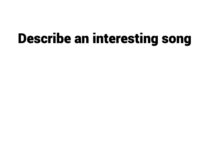Table of Contents
Describe a Useful Skill That You Learned As a Teenager

Cue Card
You should say:
- What the skill is
- When and how you learned it
- Who you learned it from
- And explain why you learned it
Sample Answer 1
The skill I’d like to talk about is playing the guitar. I started learning it at the age of around 15, and every holiday during high school, I would take lessons to learn this musical instrument.
Initially, it was quite challenging as I had to get used to finger placements and chords. So, I learned it at a local music school near my home. They had professional guitar teachers and well-structured courses that guided me from the basics to more advanced techniques.
I still remember learning this skill from a very patient and talented teacher. He was a professional guitarist and had a passion for music that was truly inspiring. I mean, he always encouraged us to feel the music and express our emotions through it.
The reason I decided to learn this skill was mainly because of my love for music. I always admired musicians who could play instruments and create beautiful melodies.
Besides, I believed that being able to play a musical instrument was a valuable skill that could bring joy to others and myself. Over time, it has become a way for me to relax and express myself. It’s a skill that I’m really glad I learned.
However, as time went on and I became busier with school and later on, work, I found less time to practice. So, even though I acquired the skill, it became rusty over the years due to a lack of practice. It’s a bit of a regret for me as I genuinely enjoyed playing. And I hope to pick it up again in the future.
Sample Answer 2
I would like to talk about the skill of swimming, which I learned during my childhood. I believe this skill is not only enjoyable but also crucial for personal safety.
I started learning how to swim when I was around 8 years old. My parents enrolled me in a local swimming class during the summer vacation. The classes were held at a community pool, and they were organized by certified swimming instructors. The lessons took place three times a week, and each session lasted for about an hour.
I learned the basics of swimming, including floating, kicking, and different strokes. The instructors were experienced and patient, providing individual attention to each student. They also emphasized water safety, teaching us how to tread water and what to do in case of an emergency.
I learned swimming primarily from the instructors at the community pool, but my parents also played a supportive role by encouraging me to practice regularly and ensuring I attended all the classes.
The reason I learned how to swim was twofold. Firstly, it was seen as an essential life skill by my parents, who believed that everyone should be able to swim for safety reasons. Secondly, I was drawn to the idea of being comfortable in the water and enjoying aquatic activities during family outings or vacations. Learning to swim not only provided me with a valuable life skill but also opened up opportunities for recreation and enjoyment in various water-related activities.
In conclusion, learning how to swim during my childhood was a valuable and enjoyable experience. The skill not only enhanced my safety awareness but also allowed me to participate in water-based activities, contributing to a well-rounded and enjoyable childhood.
Part 3
1. Where do children learn skills in your country?
In my country, children can learn skills from various sources. Apart from formal education from schools, they learn skills through extracurricular activities, such as joining after class activities or organizations related to their interests. They may also learn skills from their parents, relatives, or family members who have expertise in a particular area. And, online platforms also provide opportunities for children to learn new skills nowadays.
2. What are the differences between learning skills on your own and from others?
Learning skills on your own requires self-motivation, discipline, and doing your own research. It’s about exploring different resources, practicing, and learning from your mistakes to get better.
On the other hand, learning from others is all about getting guidance, feedback, and the chance to learn from their experiences. It provides a more structured learning environment and the opportunity to gain insights and knowledge that may not be easily accessible when you’re learning on your own.
3. What important skills should a child learn?
From my experience, I believe that communication skills, critical thinking, problem-solving, creativity, adaptability, and teamwork are all essential for children to learn. However, the most important skill for children to learn is reflecting on their day. This goes beyond simply reviewing what they learned, it involves introspection on all aspects, including their actions, methods, lessons learned, understanding of what they learned, and how they spent their time. This skill is crucial not only for their studies but also for their future careers.
4. What skills do you think teenagers should have?
Teenagers should have skills that help them to prepare for adult life and future careers. These skills include managing their time effectively, setting goals, making decisions, understanding finances, and being emotionally intelligent.
Additionally, being tech-savvy and knowing how to stay safe online are crucial in today’s digital world.
5. Who should teach teenagers skills?
I believe that teenagers can learn skills from various sources. Parents and teachers are primary sources of learning. Parents are responsible for teaching children life skills and the realities of life, while teachers are the main sources of academic knowledge and other important skills, such as critical thinking, problem-solving, and teamwork. Other sources, such as professionals in relevant fields and online platforms, also provide opportunities for skill development.
6. What are the differences between children learning skills and adults learning skills?
Children learning skills often involves a more structured and guided approach. They may rely more on instructions, demonstrations, and step-by-step guidance. Adults, on the other hand, tend to have a higher level of independence and self-direction in their learning. They may have more life experiences to draw upon and may approach learning with specific goals and objectives in mind.
Some IELTS Speaking part 2 cue-cards you may like :
- IELTS Speaking Part 1 From January to April 2024
- IELTS Speaking Part 2 From January to April 2024
- (2024) Describe a Time When You Picked Up An Item That Someone Else Lost
- (2024) Describe a Time You Had To Finish Something Quickly
- (2024) Describe a Trip You Were Looking Forward To But Was Delayed
- (2024) Describe a Movie/Film That You Felt Strongly About
- (2024) Describe A Photo That Makes You Feel Happy
- (2024) Describe An Activity That Made You Feel Tired
- (2024) Describe a Party That You Enjoyed
Credits
Image : Photo by Impress Bashyal on Unsplash


